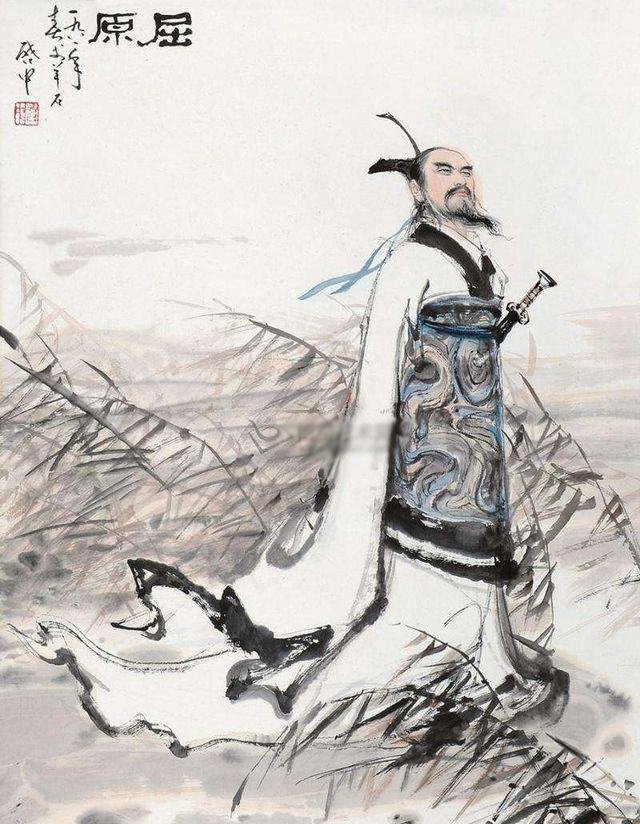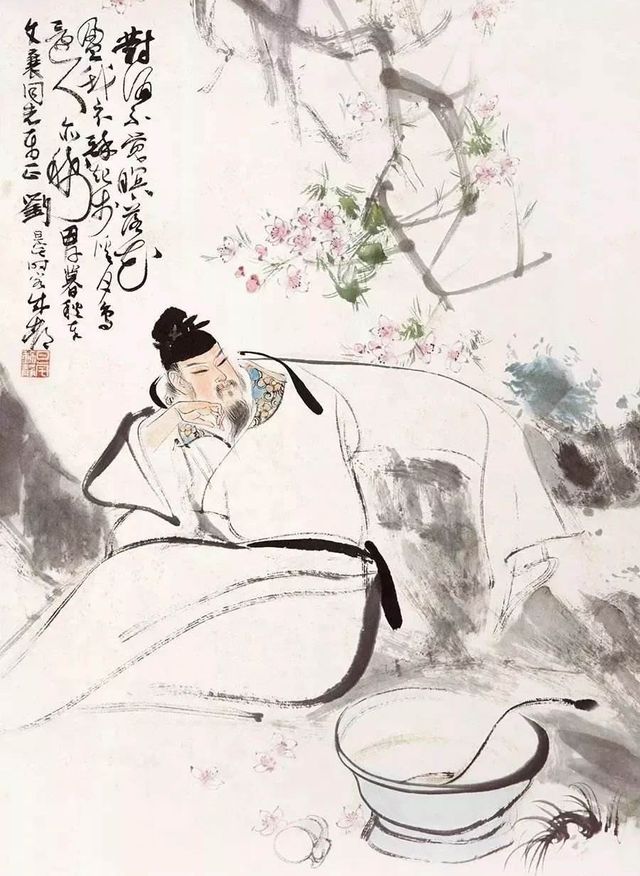As a historical and cultural country, there are many very famous poets in Chinese history. Their poems will appear in textbooks in modern times, educating more people. Poets in ancient China were good at using very short sentences to describe life, scenery, criticize current affairs, or express inner feelings. This post introduces you to the top 10 famous poets in ancient China.
1. Qu Yuan 屈原

2. Li Bai 李白

3. Du Fu 杜甫
Du Fu (712-770), courtesy name Zimei, self-named Shaolingye Lao, originally from Xiangyang, and later moved to Gongxian, Henan, was a great realist poet in the Tang Dynasty. Together with Li Bai, he was called “Li Du”. Du Fu’s influence in Chinese classical poetry is very far-reaching, and he is called “Poem Sage” by later generations, and his poems are called “Poetry History”. Du Fu created masterpieces such as “Spring Hope”, “Northern Expedition”, “Three Officials” and “Three Farewells”.
4. Su Shi 苏轼
Su Shi (January 8, 1037 – August 24, 1101), styled Zizhan, and also styled Hezhong, with the name Dongpo Jushi, was known as Su Dongpo and Su Xian in the world. Han nationality, a native of Meishan, Meizhou (now Meishan City, Sichuan Province) in the Northern Song Dynasty, ancestral home in Luancheng, Hebei, a famous writer, calligrapher and painter in the Northern Song Dynasty In the second year of Jiayou (1057), Su Shi Jinshi and the first. Song Shenzong worked in Fengxiang, Hangzhou, Mizhou, Xuzhou, Huzhou and other places. In the third year of Yuanfeng (1080), he was demoted to Huangzhou because he was framed in the “Wutai Poetry Case” and served as the deputy envoy of Tuan Lian. After Song Zhezong ascended the throne, he served as the Bachelor of Hanlin, Bachelor of Reader, Minister of Rites, etc., and traveled to Hangzhou, Yingzhou, Yangzhou, Dingzhou and other places. In his later years, he was demoted to Huizhou and Danzhou due to the new party ruling.
5. Tao Yuanming 陶渊明
Tao Yuanming (352 or 365 – 427), courtesy name Yuanliang, also known as Qian, private posthumous “Jingjie”, known by the world as Mr. Jingjie, a native of Xunyang Chaisang (now Jiujiang City, Jiangxi Province). From the end of the Eastern Jin Dynasty to the beginning of the Southern Song Dynasty, he was a great poet and cifu writer. He once served as Jiangzhou Jijiu, Jianwei joined the army, Zhenjun joined the army, and Pengze county magistrate. He is China’s first idyllic poet, known as “the sect of ancient and modern recluse poets”, and has “Tao Yuanming Collection”.
6. Bai Juyi 白居易
Bai Juyi (772~846), courtesy name Letian, nicknamed Xiangshan Jushi, also known as Mr. Zuiyin, was born in Taigu, Henan Province, and was born in Xinzheng, Henan Province. He was a great realist poet in the Tang Dynasty and one of the three major poets in the Tang Dynasty. Bai Juyi and Yuan Zhen jointly advocated the New Yuefu Movement, known as “Yuan Bai” in the world, and “Liu Bai” together with Liu Yuxi. Bai Juyi’s poems have a wide range of themes, various forms, and simple and popular language. He is known as “Poem Demon” and “Poem King”. Bai Juyi’s “Changqing Collection of Bai’s Family” has been handed down, and his representative poems include “Song of Everlasting Regret”, “Charcoal Merchant”, “Pipa Xing” and so on.
7. Kou Zhun 寇准
Kou Zhun (961-October 24, 1023), courtesy name Pingzhong, was a native of Xiagui, Huazhou (now Weinan, Shaanxi), a statesman and poet in the Northern Song Dynasty; together with Bai Juyi and Zhang Renyuan, he was known as the “Three Sages in Weinan”. Kou Zhun is good at poetry and prose, and his seven unique poems are particularly charming. There are three volumes of Kou Zhongmin’s Poetry Collection. In the fourth year of Huangyou (1053), Song Renzong issued an edict to erect a Shinto tablet for him, and wrote the character “Jing Zhong” on the head of the tablet. Most people call it Kou Zhongmin or Kou Lai.
8. Wang Wei 王维
Wang Wei (701-761, or 699-761) was born in Puzhou, Hedong (now Yuncheng, Shanxi), and his ancestral home was Qixian, Shanxi. He was a famous poet and painter in the Tang Dynasty. Wang Wei was born in the Wang family of Hedong, and was the first scholar in the nineteenth year of Kaiyuan (731). The calendar official is the right pick up, the supervisory censor, and the judge of the Hexi Jiedu. During the Tianbao reign of Emperor Xuanzong of the Tang Dynasty, Wang Wei worshipped the minister of officials and gave him the job. When An Lushan captured Chang’an, Wang Wei was forced to take a false post. After Chang’an was recaptured, he was assigned the title of Prince Zhongyun. During the reign of Emperor Suzong of Tang Dynasty, he was appointed as Shangshu Youcheng, so he was called “Wang Youcheng”.
9. Li Shangyin 李商隐
Li Shangyin (about 813-about 858), courtesy name Yishan, named Yuxi (Xi)sheng, also known as Fan Nansheng, was born in Hanoi, Huaizhou (now Qinyang, Jiaozuo, Henan), and was born in Xingyang, Zhengzhou (now Xingyang City, Zhengzhou, Henan). A famous poet in the late Tang Dynasty, together with Du Mu, he was called “Little Li Du”, and with Wen Tingjun, he was called “Wen Li”. Li Shangyin was one of the few poets who deliberately pursued the beauty of poetry in the late Tang Dynasty and even in the whole Tang Dynasty. He was good at poetry writing, and the literary value of parallel prose was also very high. His poems were novel in conception and beautiful in style, especially some love poems and untitled poems. It is lingering, beautiful and moving, and widely read.
10. Li Yu 李煜
Li Yu (August 15, 937~August 13, 978), the sixth son of Li Jing, the sixth son of Yuanzong of the Southern Tang Dynasty (i.e., the middle master of the Southern Tang Dynasty), the first name was Congjia, the word Chongguang, the number Zhongyin, Lianfeng lay Buddhist, born in Jinling (now Nanjing, Jiangsu), his ancestral home is Pengcheng (now Tongshan District, Xuzhou, Jiangsu), the last monarch of the Southern Tang Dynasty. In the second year of Jianlong in the Northern Song Dynasty (961), Li Yu succeeded to the throne, respecting the Song Dynasty as the orthodox, and paying tribute to ensure safety. In October of the fourth year of Kaibao (971), Song Taizu destroyed the Southern Han Dynasty, and Li Yu removed the Tang name and changed his name to “Jiangnan King”. In the third year of Taiping Xingguo (978), on July 7, Li Yu died in Bianjing.
See Also: Top 10 Ancient Chinese Love Stories
[…] For five thousand years, Chinese culture has been leading the way. In the thick historical scroll, there are countless young talents who have made contributions to poetry, lyrics and songs. Among them, there are also many talented women. This post will introduce you to the top 10 talented women in ancient China. See Also: Top 10 Poets in Ancient China […]
[…] There are some very famous paintings in Chinese history that have been handed down, and some people’s paintings have been plundered overseas by Western countries. Ancient Chinese painters were very good at creating landscapes, animals, and life scenes. This post brings you 10 famous ancient Chinese painters.Since ancient times in China, calligraphy and painting are one family. People who are successful in calligraphy are also very good at painting. See Also: Top 10 Famous Poets in Ancient China […]